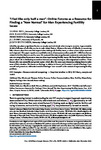"I feel like only half a man"
| dc.contributor.author | Patel, D | |
| dc.contributor.author | Blandford, A | |
| dc.contributor.author | Warner, M | |
| dc.contributor.author | SHAWE, JILL | |
| dc.contributor.author | Stephenson, J | |
| dc.date.accessioned | 2020-07-15T13:57:59Z | |
| dc.date.available | 2020-07-15T13:57:59Z | |
| dc.date.issued | 2019-11-07 | |
| dc.identifier.issn | 2573-0142 | |
| dc.identifier.issn | 2573-0142 | |
| dc.identifier.uri | http://hdl.handle.net/10026.1/16035 | |
| dc.description.abstract |
Infertility can place a significant burden on couples and individuals when trying to conceive. Approximately 20-30% of all cases of infertility are due to male-related factors. Whatever the cause of difficulty in conceiving, little is known about how men find support when dealing with fertility issues, or when or how online resources are being used. This paper reports on a qualitative study of anonymous online posts (N=603) from forums related to fertility that are used by men. We analysed this data using thematic analysis to understand how men are using online forums as a resource when experiencing fertility issues. We found that online forums play a valued role in facilitating connections between men experiencing an often stigmatised condition. These forums offer men accessible and private spaces which allow for more open discussion, helping them to make sense of their situation. We discuss our findings in relation to Genuis and Bronstein's model of finding a "new normal" and present our elaborated model of finding a "new normal" in the context of experiencing fertility problems. | |
| dc.format.extent | 1-20 | |
| dc.language | en | |
| dc.language.iso | en | |
| dc.publisher | Association for Computing Machinery (ACM) | |
| dc.subject | Infertility | |
| dc.subject | Contraception/Reproduction | |
| dc.subject | Reproductive health and childbirth | |
| dc.title | "I feel like only half a man" | |
| dc.type | journal-article | |
| dc.type | Editorial | |
| dc.type | Journal | |
| plymouth.issue | CSCW | |
| plymouth.volume | 3 | |
| plymouth.publication-status | Published | |
| plymouth.journal | Proceedings of the ACM on Human-Computer Interaction | |
| dc.identifier.doi | 10.1145/3359184 | |
| plymouth.organisational-group | /Plymouth | |
| plymouth.organisational-group | /Plymouth/Faculty of Health | |
| plymouth.organisational-group | /Plymouth/Faculty of Health/School of Nursing and Midwifery | |
| plymouth.organisational-group | /Plymouth/REF 2021 Researchers by UoA | |
| plymouth.organisational-group | /Plymouth/REF 2021 Researchers by UoA/UoA03 Allied Health Professions, Dentistry, Nursing and Pharmacy | |
| plymouth.organisational-group | /Plymouth/Research Groups | |
| plymouth.organisational-group | /Plymouth/Research Groups/Institute of Health and Community | |
| plymouth.organisational-group | /Plymouth/Research Groups/Plymouth Institute of Health and Care Research (PIHR) | |
| plymouth.organisational-group | /Plymouth/Users by role | |
| plymouth.organisational-group | /Plymouth/Users by role/Academics | |
| dcterms.dateAccepted | 2019-01-01 | |
| dc.rights.embargodate | 2022-1-21 | |
| dc.identifier.eissn | 2573-0142 | |
| dc.rights.embargoperiod | Not known | |
| rioxxterms.versionofrecord | 10.1145/3359184 | |
| rioxxterms.licenseref.uri | http://www.rioxx.net/licenses/all-rights-reserved | |
| rioxxterms.licenseref.startdate | 2019-11-07 | |
| rioxxterms.type | Journal Article/Review |


